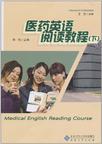医药英语阅读教程
2010-8
北京师范大学出版集团,安徽大学出版社
228
随着医学现代化的发展,英文医学文献浩如烟海。阅读英语医学文献的能力成为我们医学院校学子必须具备的基本技能之一。《医药英语阅读教程》是我们教研室英语教师献给医药学生的一份礼物。它是在教学实践的基础上,根据学生的需求编写而成的。 国家教育部新颁布的全国《大学英语教学大纲》(修订本)明确指出:“本科学生在完成基础阶段的学习任务,达到四级或六级后,都必须修读专业英语,以便从基础学习阶段过渡到应用阶段。”而许多医学学生感到英语学习是一个沉重的负担,花费太多的时间和精力,但目前所学的英语对今后并没有实用价值。针对这一难题,我们组织编写了这本《医药英语阅读教程》,旨在帮助医学本科生顺利地从基础英语学习阶段过渡到英语应用阶段。在编写过程中,我们力求通过每篇文章的编排让学生掌握有关医药学英语文体的写作特点及常用词汇,以期提高其阅读能力,达到教学目标。课本内容尽力涵盖各科室各种病的常用英语,对一些较难的医学术语给予了翻译,在他们未来的门诊询问、开药处方、病情查房、病例书写、论文撰写、浏览医学英语文献等方面大有帮助。这本书题材多样,篇幅长短适宜,并配有相应的测试题,全书独立成篇。 虽然编者竭尽全力想给读者提供最佳产品,但因时间仓促,且水平有限,书中错误遗漏之处在所难免,恳请读者使用时不吝赐教。
随着医学现代化的发展,英文医学文献浩如烟海。阅读英语医学文献的能力成为我们医学院校学子必须具备的基本技能之一。《医药英语阅读教程》是我们教研室英语教师献给医药学生的一份礼物。它是在教学实践的基础上,根据学生的需求编写而成的。 国家教育部新颁布的全国《大学英语教学大纲》(修订本)明确指出:“本科学生在完成基础阶段的学习任务,达到四级或六级后,都必须修读专业英语,以便从基础学习阶段过渡到应用阶段。”而许多医学学生感到英语学习是一个沉重的负担,花费太多的时间和精力,但目前所学的英语对今后并没有实用价值。针对这一难题,我们组织编写了这本《医药英语阅读教程》,旨在帮助医学本科生顺利地从基础英语学习阶段过渡到英语应用阶段。在编写过程中,我们力求通过每篇文章的编排让学生掌握有关医药学英语文体的写作特点及常用词汇,以期提高其阅读能力,达到教学目标。课本内容尽力涵盖各科室各种病的常用英语,对一些较难的医学术语给予了翻译,在他们未来的门诊询问、开药处方、病情查房、病例书写、论文撰写、浏览医学英语文献等方面大有帮助。这本书题材多样,篇幅长短适宜,并配有相应的测试题,全书独立成篇。
Lesson One Internal Impairment Due to Seven EmotionsLesson Two Learning to Live with PestsLesson Three Sleep EasyLesson Four DrugsLesson FiveLate-night DrinkingLesson Six The AnnouncementLesson Seven The Best WaysLesson Eight The Relationship Between Blood and Body FluidLesson Nine New U.S. Plan for Disease PreventionLesson TenA Study on the Effect of Passive SmokingLesson Eleven Is the News Believable?Lesson Twelve Hepatitis A Sickens 64Lesson Thirteen The Contraindication for GatifloxacinLesson Fourteen UlcersLesson Fifteen The Immune SystemLesson Sixteen Medical Plants(1)Lesson Seventeen Medical Plants(2)Lesson Eighteen Massage TherapyLesson Nineteen The Body ClockLesson Twenty The Development of American Medical Education.,Lesson Twenty-one Childhood Obesity: The Health IssueLesson Twenty-two Chinese Medicine Extracts Effective in Combating DiabetesLesson Twenty-three Catch Them YoungLesson Twenty-four What Is Rehabilitation?Lesson Twenty-five Brain WaveLesson Twenty-six Ancient Chinese Remedy in Preventing Breast CancerLesson Twenty-seven Chinese Medicines Great Waste of ResourcesLesson Twenty-eight The Difference Between AIIopathic Medicine and TCMLesson Twenty-nine The Magic Anti-tumor Herb——MatrineLesson Thirty The Five-element TheoryLesson Thirty-one Leptin and ObesityLesson Thirty-two Chinese AcupunctureLesson Thirty-three Cholesterol and HealthLesson Thirty-four The Small IntestineLesson Thirty-five Vaccines Against CancerLesson Thirty-six Researches on the Prostate CancerLesson Thirty-seven Test for Cervical CancerLesson Thirty-eight Five Forms of HepatitisLesson Thirty-nine Cardiologist Says Vioxx Still a Risk After StoppingLesson Forty Magic Chinese HerbLesson Forty-one Gene Therapy Could Cure Muscular DystrophyLesson Forty-two Where Did Aspirin Come From?Lesson Forty-three Traditional Chinese Medicine with a Long History (1)Lesson Forty-four Traditional Chinese Medicine with a Long History (2)Lesson Forty-five Vitamins and HealthLesson Forty-six Himalayan Salt Crystal LampsLesson Forty-seven Sub-health——the Third Health ConditionLesson Forty-eight Surviving CancerLesson Forty-nine Self-medicationLesson FiftyBreast Cancer Screening and PreventionKeys
The seven emotions refer to joy, anger, anxiety, contemplation, grief, fear and terrorwhich are different responses of the body to the environmental stimuli and are normalpsychological activities. Normally the seven emotions will not cause disease, but sudden,violent or prolonged emotional stimuli, beyond the range of physiological activities, will causedisorder of qi activity and disharmony of visceral yin, yang, qi and blood which consequentlylead to disease. Since theseven emotions are endogenous and directly affect visceral qi andblood, the internal disorder caused is called "internal impairment due to seven emotions". The seven emotions are the physiological responses of visceral qi, blood, yin and yang.Different visceral qi, blood, yin and yang differ from eachother in moving styles, leading todifferent emotional responses. In Huang Di Nei Jing~, the seven emotions are matched withthe five viscera: the heart governs joy, the liver governs anger, the spleen governscontemplation, the lung governs grief, and the kidney governs fear. Terror and anxiety are alsoclosely related to the activity of qi in the five zang-organs. The attribution of the seven emotions to the five zang-organs is not absolute. On the onehand, the same viscus may produce different emotional responses because of differentpathophysiological states. For example, excess of liver-q/causes anger while deficiency of liver-qi brings on fear; excess of heart-qi brings on joy while deficiency of heart-qi leads to grief;etc. On the other hand, the seven emotions are exclusively dominated by the heart. In fact allthe emotional activities are controlled by the heart and all the emotional responses are themanifestations of heart-spirit.
